- Home
- Gregory Ashe
Ember Boys (Flint and Tinder Book 1) Page 2
Ember Boys (Flint and Tinder Book 1) Read online
Page 2
On the fifth or seventh match, tinder caught, and Rosie breathed the fire to life. Then she dropped onto her butt and held out her hands. She was wearing Patagonia coveralls, moccasins with a hole in the sole, and a flannel shirt that was the same color as her hair, although I didn’t think it had started that way.
“You got dinner?” she asked as I walked up.
I shook my head.
“I got a couple of wieners, you want some.”
Emmett would have laughed. Emmett would have said something clever.
“I’ll be all right.”
“You have one or two. You’re skinny.”
She crawled into her tent, got an Igloo cooler, and set it next to her on the beach.
“You can do the sticks,” she said.
So I got my pocketknife, found two decent sticks, and whittled the ends to points. I hadn’t noticed the cold in twenty-five years, but I knew everyone else still felt it. Rosie leaned toward the blaze, hands cupped as though she could gather the heat and carry it with her. I thought of the way I had held my hands a few hours before. I thought of Emmett, his hand, the red circle that was doubtless going to blister.
“Thinking about your boy?”
It had been easier not to try to explain. In some ways, maybe it had been truer.
I nodded.
“That stuff messes you up,” Rosie said. “Time I was in the hospital, I told them no thank you. None of that stuff for me.”
“Smart.”
“He’ll be ok. They got him on methadone or buprenorphine?”
She had gone to Yale, she had told me, weeks after we first met. She had graduated in chemistry, but today, her classes probably would have been called biochemistry. She lived now by drawing in the sand and accepting tips, a kind of busking without the high energy.
“Buprenorphine and naltrexone.”
“That’s good, that’s good. Might be they could get him off it completely. How old is he?”
“Seventeen. No, eighteen.”
“Plenty young. He’ll be all right.”
They called it opioid use disorder; Emmett came from a family with so much money that nobody had addictions or problems. They had issues. They had disorders. I’d seen the track marks on the inside of his arm; one time, on an October day so hot that the world had shimmered like a gong, Emmett had held out his arm and asked me to count them. I don’t know why, but I did, and before I finished, he was crying so hard that I had to stop. He spent the rest of the day draped across me, sweat sticking us together, even after he’d stopped crying. Disorder was a pale fucking word for what heroin had done to that kid.
“He’ll be all right,” she said again, sliding the wieners onto the roasting sticks and passing one to me.
“He’s not all right, though. The addiction is one thing; they can treat the addiction, manage it. But inside . . .”
“He’ll be all right.”
“Screw all right. I don’t want him to just be all right.”
The smell of searing meat made my stomach grumble; fat dripped from the roasting dogs, and the flames leapt up to lick it.
“He’s got you, don’t he?” She patted my arm and then turned her attention back to the wiener, rotating it slowly, like she might be serving it to a king. “Whatever else, that means he’ll be all right.”
Long after I crawled in the tent, I thought about what she’d said. Emmett had me. I looked at the polyester lining, the curve of the tent pole, the way the slight knobbiness reminded me of Emmett’s spine. I had seen him without his shirt; the thought lay at the edge of consciousness, lighting and then lifting away, a butterfly thought. Another hot day, what my parents had called Indian summer. The garden. The grass rippling in the breeze off the sea. The sun cutting everything into lines of light and shadow. He had slipped out of the shirt like he was alone, stretching out on the grass, eyes closed.
When I stood, he said, “Don’t go.”
I tried everything. I watched the ocean, which never ended. I stared up at the sky, until the reflected light on the clouds made my eyes water. Then, when I couldn’t anymore, I looked down. I counted ribs. I traced, with my gaze, the hollow of one shoulder. He shifted, and a tuft of dark hair peaked out from under one arm, and then, like he knew, he strummed his abs like he was playing the guitar.
That’s what Emmett had in his life, I thought now, the darkness and the polyester suffocating me. A pervert. An old man who likes to watch. I used to be a teacher. I used to help kids. I had packed up all the shit in my life. I was finally moving forward. I was even dating again, although I knew, deep down, I could never make anything serious work.
Now I was nothing. And Emmett needed more than nothing.
3 | EMMETT
In group, Jonas was sleeping on me. Again. He was nineteen, a year older than me, although you couldn’t tell it by the boxcar pajamas and the staticky nimbus of hair. I shifted in my seat, trying to get his chin out of my shoulder, and caught his head before it could roll off. By the end of group—every time—I’d have a wet spot the size of California on my shirt.
I knew everybody in group by now, except the latest addition. I had to admit: the new girl was interesting. She had ashen-blue hair down to the middle of her back, huge Warby Parker glasses, and holes up and down both ears and in her nose—no piercings allowed, once you checked in at the Spa Elredo. Sitting between Frances, who had gray hair in a beehive, kind of Bride of Frankenstein, and Norman, who was almost seventy and still picked his nose, she looked like she’d been filed wrong. No matter how many times I looked at her, she refused to meet my eyes.
San Elredo was pricey; I knew that, because my parents made a point of telling me how much money I was costing them. Mom wouldn’t get her Louis Vuitton bag this month. Dad might have to use the same clubs two seasons in a row. Jonas, asleep on my shoulder, was the younger brother of a tech exec; he wouldn’t say where his brother worked, just that he made gajillions. That’s the word Jonas used. He loved words like that. I mention the price because I’d expected star treatment; I’d assumed the psych ward would be kind of like those minimum security prisons for rich people—it’s just a name, help yourself to the caviar, turn-down service is at eight.
But San Elredo wasn’t like that at all. It wasn’t even really a hospital. Not the kind that made people better, anyway. It was a few big things and a lot little things that had started to add up over the months. Little things like group.
In theory, group was supposed to be therapy. Get a bunch of crazies together, get somebody a little less crazy to run the show, and turn the whole thing loose. But the reality wasn’t quite the same. People talked, sure. Donna, who was just a few years older than me, for example. She talked a lot. She liked to tell everybody what they were doing wrong. I was one of her favorite topics—an embarrassment of riches, I assumed—and today, she was really going.
“And you shouldn’t have let your girlfriend leave the tent in the middle of the night.”
I nodded and then reached up to catch Jonas before his head could fall.
“And you shouldn’t have told that girl in fifth grade that you’d rather kiss her boogers.”
“Marcy,” I said. “She moved the next summer.”
“You shouldn’t have tortured that boy who liked you and then let your dad sue his family after he hit you.”
“Definitely not,” I said. Then, before she could continue, “One time, I really liked this boy and I wouldn’t take him to meet my parents because he was poor and kind of a mess. Talk about that.”
Donna, who looked a little like a Powerpuff girl with her huge eyes and her hair pulled back, squirmed to the edge of her seat, quivering with new material. “You realize that this is another perfect example of how you’re a selfish, manipulative, emotionally closed-off—”
I nodded; she had enough to work on me for another week, and so I just sat back and adjusted Jonas’s chin again. This time, I noticed the bruise. High
on his hairline, almost invisible unless you had the privilege of being a human pillow for Jonas three times a week. The bruise was still purple, maybe a day old. I thought about this and looked at Mary Lourdes, the tech in charge of group. That’s right: not a psychiatrist, not a trained and licensed therapist. Mary Lourdes, who ate tuna out of homemade foil packets and wore compression hose because she sat on her ass all day. Mary Lourdes, who once had pushed Norman, the nosepicker, down a flight of stairs. I saw it, and I knew, no matter what bullshit story she told.
After group ended, I walked around for a while: long, blank halls of blank walls and blank doors. Some things changed—I’d see Frank cleaning between his toes, maybe, or Janelle would be drawing penises on her slippers. But in terms of what mattered, nothing changed. Nothing ever changed.
Eventually I finished the circuit, ending up in the rec room. The girl with the ashen-blue hair was flipping channels.
“They had to replace the remote,” I said. “The power button didn’t work after Nora threw the last one.”
She punched the rubberized button: three channels up, one-two-three, before she could even see what Bugs was doing, or check out the jewelry they were selling, or watch the CSI guys and gals analyze a hair follicle.
“What’s your name?” I asked.
Another rapid one-two-three: guys playing pool; High School Musical; a cartoon I didn’t recognize.
“Hey,” I said.
“Fuck off,” she said, cocking her arm like she meant to pitch the remote at me.
“If you throw it, throw it at the screen. That way, maybe we get a new TV.”
One-two-three: Wolf Blitzer, then a guy who looked really fucking Republican, and then a weather lady with cumulonimbus breasts.
“Fuck off,” she said again.
I dragged a chair over to the sofa; the new girl hadn’t flipped past the weather. Maybe she really loved hearing about rain. Maybe she really wanted to know the high in Missoula.
“I’m Emmett.”
“Oh my God. I heard about you.”
“Oh yeah?”
“No. Now fuck off.”
She was watching the weather lady like those big old weather balloons out in front might take off all of a sudden.
“Let me guess,” I said, spreading my knees, hands behind my head, biting the corner of my mouth. “Combat boots, big ones. Leather jacket with BITCH or CUNT in metal studs across the back. Motorcycle? You look like you own a motorcycle.”
Her eyes flicked toward me. The way she looked was confirmation. It wasn’t a short look; she took her time, which said something about her. Not a lot of people could look at my face, at the scars, that long. But it was also the way she looked at me.
Then she turned back to the TV.
“You got a girlfriend?” I asked.
“Do you?”
“Not anymore. She tried to cut my throat.”
She looked again. “That one of your scars?”
“No, these are from something else.”
“Too bad.”
“Yeah.”
“So you’re crazy, huh?” she asked.
I didn’t bother holding the pose; no matter what I did, this girl wasn’t going to be interested. I relaxed in the chair and kicked my feet up onto the sofa.
“Not crazy.”
“Nobody is, sounds like.”
“I mean, I’m screwed up, but I’m not crazy.” I held up my hand, showing her the burn. “Proof.”
She just nodded. “How long are you in here for?”
“Until I’m better. Whatever that means.”
“You can’t get out?”
“Like, leave?” I shrugged. “I don’t think anybody here can. It’s all what we politely call ‘involuntary treatment.’” I frowned. “That’s not the case with you?”
“Oh,” she said, a little too slowly. “Yeah, I mean, I guess so.”
I waited, but she didn’t add anything. I finally said, “In rehab, I could leave whenever I wanted. I had to get permission first, but they always let me go. Then I got sent here.”
“You’re a minor?”
“Not since June.”
“They can’t hold you here unless you’re a minor.”
“They can,” I said. I pointed to my face, the whirling mass of scars. “They think I did this to myself.”
“Sick,” she said, sounding impressed in spite of herself.
“They’ve got a six-month order keeping me here.”
“What do the doctors think?”
“I want to kill my dad and sleep with my mom.”
“Same,” she said, squirming into a more comfortable position on the sofa.
“You?” I said.
“Oh, I’m crazy.”
“Yeah?”
“Psycho.”
“Ok.”
“I killed this whole family. Chopped them up. Made smoothies out of them.”
“Sounds like a lot of work. You can just go to Jamba Juice, you know.”
“Yeah, but I hate the corporate bullshit.”
“Right.”
I watched her for a little bit, trying to figure out what I wanted. To make her angry? To make her my friend? First one, then the other?
“What’s up, buttercup?” she asked before I could decide.
“Nothing.”
“Then don’t stare.”
“You’re staring at that lady.”
“She’s got nice tits.”
“Yeah, but you shouldn’t stare.”
“It’s not like she knows. She’s not even here.”
“Principle of the thing. It’s objectifying.”
“Bruh,” she said, looking me up and down. “You’re a puss-wipe. You know that, right?”
“Huh,” I said.
“Just so you know.”
“I did not know.”
The program cut to a middle-aged anchorman at a desk, and the girl let out a disgusted breath. Sitting up, she stretched, glanced around, and looked at me.
“I’m Chloe.”
“Oh my God. I heard about you.”
Grinning, she looked past me. Then her smile faded.
The voices coming towards us were familiar.
“I’m sorry,” Jonas said, “I’m sorry, I’m sorry, I know I’m not supposed to, but I needed to. You don’t understand, I needed to.”
“This is very disappointing,” Mary Lourdes said, although she sounded anything but disappointed. “I think you need some quiet time.”
“No, I didn’t mean to. It was an accident. It just happened.”
Don’t look, I told myself.
I looked. Mary Lourdes clutched Jonas’s arm and was steering him down the hall. Blood showed where Jonas had cut himself; it ran to the crease of his elbow, and a few drops spattered the vinyl as Mary Lourdes walked him into the rec area. When her head swiveled, taking in the room, I dropped my eyes.
Jonas took advantage of her distraction; he reared back, turned, and tried to run. Mary Lourdes turned on him, slapping him across the back of the head. Jonas stumbled, crashed into the window, and bounced off the glass. It was just enough of a delay for Mary Lourdes to catch up, and then she was standing over him, raining down blows. No punches or kicks. Just a flurry of slaps designed to humiliate. Remind you who was in charge. Rip out your foundation, the part of you that made you think you were human.
“Hey,” Chloe said, “what the hell?”
“Don’t,” I said, still looking at the vinyl.
“Why is that bitch hurting him?”
“Don’t,” I said, catching her arm as she stood. “You get involved, and you get quiet time too.”
“What the fuck is quiet time?”
“What does it sound like?” I had been there once. Once was enough. Twenty-four hours without buprenorphine. Twenty-four hours with only a little water to drink. Twenty-four hours with a kiddy night light in the shape of a red-nosed clow
n staring back at me. Twenty-four hours: first, I’d peed myself; then the shakes had started; then the puking.
Jonas was sobbing. I bent forward, elbows on my knees, and put my thumbs at the corners of my eyes.
“This is bullshit,” Chloe said.
“This is Hotel San Elredo,” I said. “You can check in, but you can never leave. You know why people put us here? Because they’re tired of you. Tired of dealing with you.” A particularly loud slap landed, and Jonas wailed. I flinched. “That’s the motto here: you’ll never have to deal with them again.”
“No,” Chloe said. “They wouldn’t do that to me.”
I shrugged.
“Hey, dyke,” Chloe shouted, “pick on somebody your own size.”
The slapping stopped; without that noise, it felt like the world had dropped into a ringing silence. Jonas sobbed in the background.
“What did you say to me?” Mary Lourdes asked.
To me, Chloe said, “I’m going to fuck things up. Want to join me?”
I dug my thumbs into the corners of my eyes until it hurt. “No, thanks. I want out of here before I hit thirty.”
When she didn’t answer, I looked up.
“You’d want somebody to do it for you,” she said to me in a quiet voice. Then she walked over to the TV and unplugged it.
“Hey,” Mary Lourdes said. “Put that back.”
“Put it back,” I told Chloe.
“Put it back,” she echoed, nodding.
Picking up the TV, she ran for the window. She screamed as she ran. It sounded like a war cry. Five feet from the wall, she skidded to a stop, her arms whipping forward. The TV flew toward the glass.
It went through the floor-to-ceiling window in a spray of glass. On the lawn outside, the TV bounced once, rolled end over end, and then fell onto its side and slid a few feet.
An alarm rang throughout the hospital.
Mary Lourdes and two other techs were already heading for Chloe. One of them had his hands out like a wrestler; the other picked up a chair and held it, lion-tamer style. I shifted on my seat; Chloe saluted me, and I couldn’t meet her gaze.

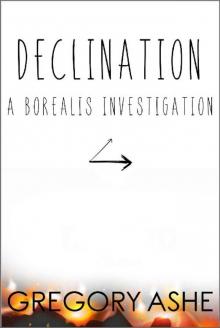 Declination
Declination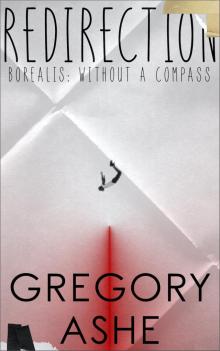 Redirection
Redirection Fold Thunder
Fold Thunder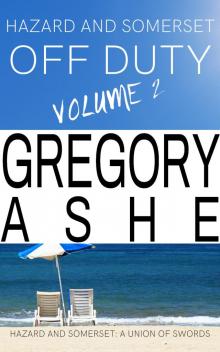 Hazard and Somerset
Hazard and Somerset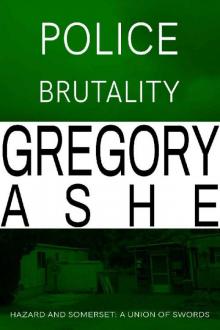 Police Brutality (Hazard and Somerset: A Union of Swords Book 2)
Police Brutality (Hazard and Somerset: A Union of Swords Book 2) Wayward
Wayward The Same End (The Lamb and the Lion Book 3)
The Same End (The Lamb and the Lion Book 3) The Dew of Flesh
The Dew of Flesh The Same End
The Same End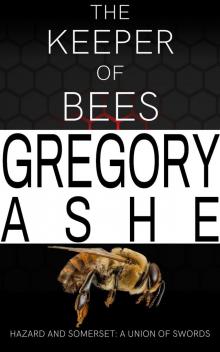 The Keeper of Bees ARC
The Keeper of Bees ARC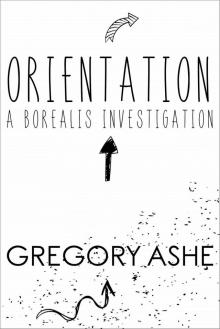 Orientation (Borealis Investigations Book 1)
Orientation (Borealis Investigations Book 1) The Indifferent Children of the Earth
The Indifferent Children of the Earth The Mortal Sleep (Hollow Folk Book 4)
The Mortal Sleep (Hollow Folk Book 4) The Rational Faculty (Hazard and Somerset: A Union of Swords Book 1)
The Rational Faculty (Hazard and Somerset: A Union of Swords Book 1) The Weeping Lore (Witte & Co. Investigations Book 1)
The Weeping Lore (Witte & Co. Investigations Book 1) Pretty Pretty Boys
Pretty Pretty Boys Transposition
Transposition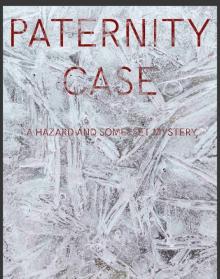 Paternity Case
Paternity Case